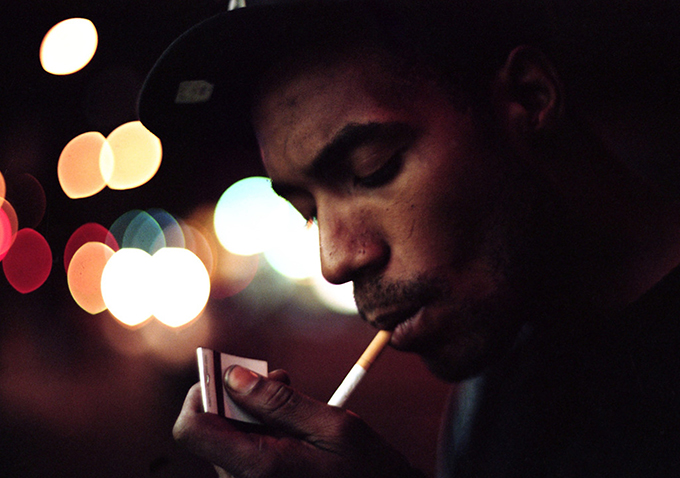 Politics are secondary to survival in Khalik Allah’s “Field Niggas”, a brief, nocturnal document of a Harlem summer spent on 125th Street and Lexington Ave. It’s the same summer of Eric Garner’s death, as it turns out, but Allah, a street photographer who spent three years prior capturing the intersection, mentions it briefly and lets expressions convey the rest. The title stems from the Malcolm X speech Message To The Grassroots, referring to the forgotten black masses that weathered every measure of punishment, and the ethnographic film similarly breathes a heavy exhaustion. It is a work stuck out on the rain-soaked street at 3 AM, kept up by the city without an alternative.
Politics are secondary to survival in Khalik Allah’s “Field Niggas”, a brief, nocturnal document of a Harlem summer spent on 125th Street and Lexington Ave. It’s the same summer of Eric Garner’s death, as it turns out, but Allah, a street photographer who spent three years prior capturing the intersection, mentions it briefly and lets expressions convey the rest. The title stems from the Malcolm X speech Message To The Grassroots, referring to the forgotten black masses that weathered every measure of punishment, and the ethnographic film similarly breathes a heavy exhaustion. It is a work stuck out on the rain-soaked street at 3 AM, kept up by the city without an alternative.
Despite the allusions, Allah leaves history to others. Viewers may link the intersection to Velvet Underground lyrics, or news items on drug use and homelessness, but the director keeps his subject matter—the mostly black, impoverished people living on the streets and nearby—present without context. He detaches his form, however: Overlapping one group or individual to the next, the subjects’ faces stay central in a tight, handheld, slow-motion frame. Allah interviews them about day-to-day life and philosophy with their spoken answers off-sync, putting an almost still image next to the rapid-fire dialogue.

Names of those we meet are rarely spoken, and instead we observe their interactions and immediate thoughts. There are the snippets of a man explaining the benefits of synthetic weed K2 over your average drug, a group of spoken-word poets, two police officers patrolling the block. Allah lingers on the stark details, too: the pizza crusts and McDonalds fries, slicked-down streets, and a number of startling images — something as simple as a woman’s chin wound is as disturbing as it needs to be.
It’s crucial that from front to back, over its 60-minute running time, Allah keeps the film 99% music-free. Aside from faint echoes of spirituals like “Down By The Riverside,” it features a consistent soundtrack of street noise and chatter. If a beat or melody were ever to kick in we’d be pacified, straying into potential music video territory rather than the sober, uncomfortable environment in which we remain. Words are the music, almost like a "Under Milk Wood" of Harlem, and it’s in these moments where the voices resonate seamlessly and the film finds its avant-garde groove.

Peculiarly, the presence of Allah’s voice in the film actually saps away from its effect. As he speaks to subjects, he describes his intent and concepts for the film, and in doing so grinds down its poetic atmosphere into cut-and-paste themes. "These streets is rough. I don’t see nothing positive," Allah says in one scene. It’s a scene made trivial by every instance around it proving that already.
Still, it’s compelling to see how Allah’s longtime work has rippled throughout the community, and positively so despite the director’s claims. There are consistent subjects, like a young mother and friend of Allah’s who relish copies of past photographs, or a bystander who asks when the film he’s shooting will be on YouTube. Others are aware of Allah as a matter of record as well, like a young man who yells at the director to “push play on this” before he enters into an argument.

Early on, a young woman who recognizes Allah tells him to head to Chelsea or the LES with his work, where they love stuff with “black people and drugs.” It’s a cutting line that calls out suffering for public curiosity, but “Field Niggas” wipes away mere curiosity in its first ten minutes. There’s nothing seductive about its approach, as Allah uses his hard-fought access to depict an unforgiving intersection, and the type of resilience it takes to stay there. Intimate, singular, and hallucinatory on all aesthetic levels, the film strips politics down to the bone, not always successful but never opportunistic. [B]

